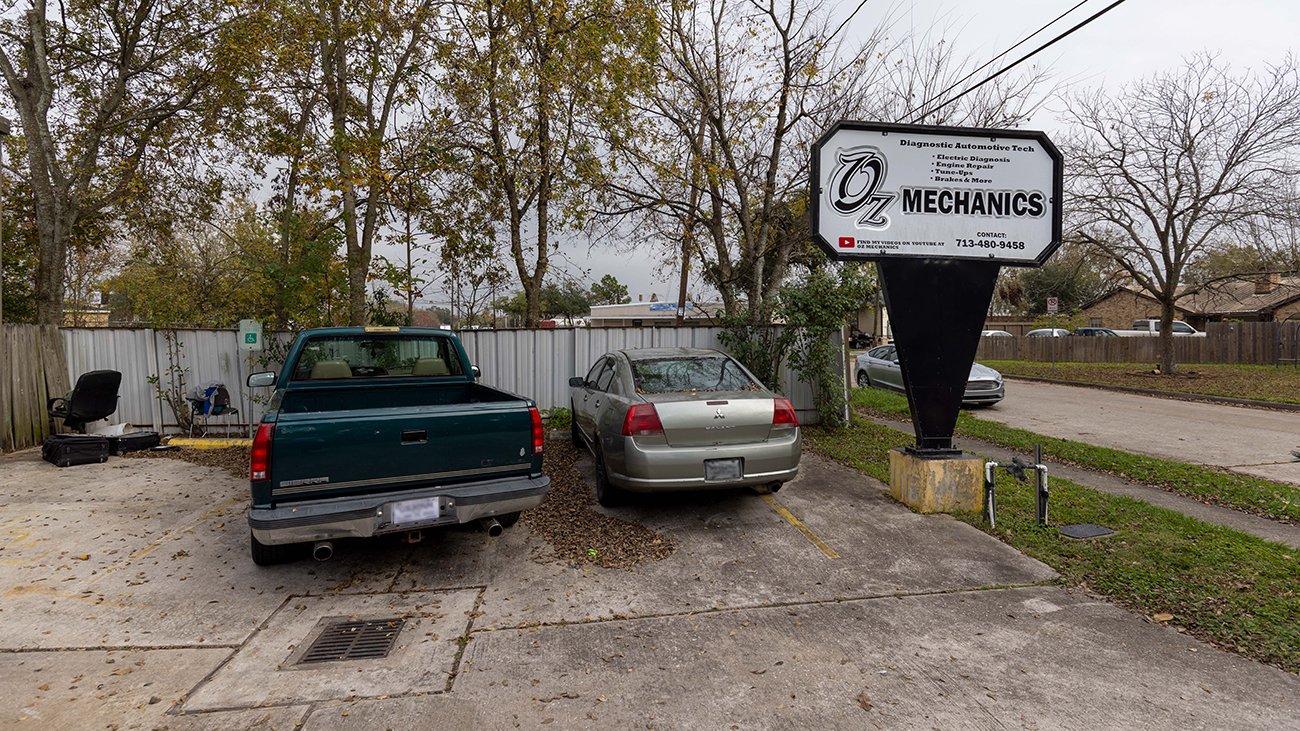Pasadena Is Pumping the Brakes on This Mechanic’s Dreams
Azael Sepulveda.
Azael Sepulveda is a car guy. He’s loved cars his whole life—driving them, tinkering with them, admiring them. Naturally, he became an auto mechanic. But the city of Pasadena, Texas, is threatening to crush his thriving business.
Sepulveda opened Oz Mechanics in 2012 at a space he leased in Pasadena. It’s a small shop—he’s the only worker and takes cars by appointment only, with just a few cars in the shop at a time—which is just the way he likes it. And he’s developed quite the reputation; he has 72 five-star reviews on Google and has a popular YouTube channel where he shares his work and love for cars.
As Oz Mechanics became more successful and his family started to grow, Sepulveda wanted to expand his business by buying his own shop. He went all-in on his dream: He used all of his savings, plus a personal loan with his house as collateral, to buy a storefront on Shaver Street. The previous owner had used the property as an auto shop since 1990, and Sepulveda believed it would only need a few minor modifications to meet his needs.
Unfortunately for Sepulveda, the city of Pasadena had other plans. It refused to allow Sepulveda to open his business unless he has 28 parking spaces. This would require Sepulveda to install a whole new parking lot at his property, which would cost $40,000—almost half of what he paid for the property. Sepulveda simply can’t afford this expense. Nor should he have to. Sepulveda already has enough parking at his shop—five outside plus another four inside the shop. This is all that Sepulveda’s business needs—he averages only two to three cars parked outside his current leased location per day. And the previous owner of his new property operated for 30 years with the current parking situation without any problem.
Sepulveda’s business, Oz Mechanics.
None of this matters to the city. Pasadena calculates parking requirements based on the size of the business’s building, regardless of what the business’s needs are. Because of the size of Sepulveda’s building, he must build a parking lot that he doesn’t need. When he explained the situation to the City, officials suggested he apply for a variance—an official exception to the zoning rules. Variances can be complicated, but luckily Sepulveda was able to put together an application with the help of volunteer attorneys.
He tried to submit it to the City in October, but city officials refused to accept the application, telling him he was ineligible. They refused to explain further, put anything in writing, or even meet with Sepulveda or his attorneys. This left Sepulveda paying the mortgage on a building the city wouldn’t allow him to open. He’s been able to keep his business running at the leased location, but paying rent and a mortgage is devastating him financially. He cannot afford to continue making both payments, and his business is in jeopardy.
The City’s parking requirements are even more peculiar when compared to ordinances in other cities across the country. Parking requirements became in vogue in the years following World War II as development surged. Today, parking takes up about one-third of land area in U.S. cities, with an estimated eight spaces per car nationwide. This has led to a growing view among city planners and economists that parking requirements cause more harm than good. They are extremely expensive for businesses to satisfy, often leave prime real estate empty, and deprive cities of green space. Cities across the country have taken notice and either eliminated or severely curtailed minimum parking requirements.
Azael Sepulveda.
But Pasadena has gone the other way. Instead of eliminating or reducing parking requirements, it has increased them. Pasadena amended its ordinance in January to increase many of the city’s parking requirements. Included in this increase was auto shops, nearly doubling their parking requirements. Pasadena’s auto repair shops now have parking requirements that far exceed those in Houston, San Antonio, Dallas, and Fort Worth as well as every city of comparable size to Pasadena. The city has given no reason for why it needs so much more parking.
Caught up in all of this is Sepulveda , who just wants to work on cars. The city demands that he spend money he doesn’t have to build a parking lot that he doesn’t need. So Sepulveda has teamed up with the Institute for Justice to fight back, given that the Texas Constitution protects small-business owners like Sepulveda from being crushed by overly burdensome government demands.
Sepulveda is a hard-working businessman providing for his growing family. He should be able to pursue his dream without having to accommodate the city’s unreasonable demands and build a parking lot that will only sit empty.
(Diana Simpson is an attorney at the Institute for Justice who represents Sepulveda. All images for this piece were provided by the author.)
Diana Simpson is an attorney at the Institute for Justice. Diana’s work has been featured by The Economist, The Wall Street Journal, The New York Times, The Washington Post, The Arizona Republic, Reason, Stossel, and other print, radio and television outlets. She co-authored “Arizona’s Profit Incentive in Civil Forfeiture: Dangerous for Law Enforcement, Dangerous for Arizonans.”
Diana received her law degree from the Roger Williams University School of Law in Bristol, Rhode Island, in 2011, where she was president of the Federalist Society. She received her undergraduate degree from Sweet Briar College in Virginia in 2008 with a Bachelor of Arts in Economics and International Affairs. Diana originally hails from Littleton, Colorado.
Diana is a member of the Colorado bar.







Relief for small businesses. A win for historic buildings. And room for more affordable housing. Dallas just scrapped a rule holding the city back since 1965.